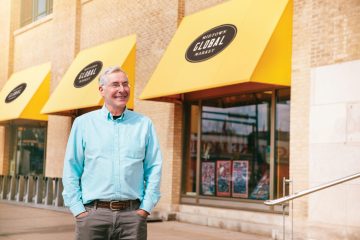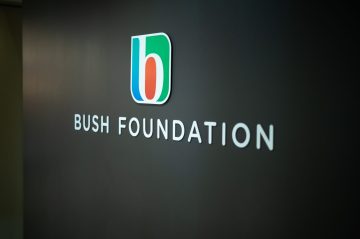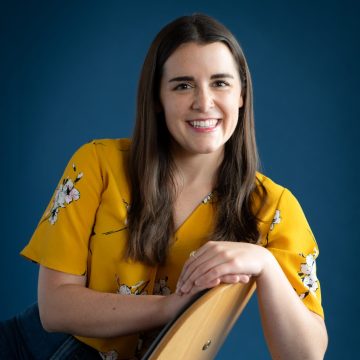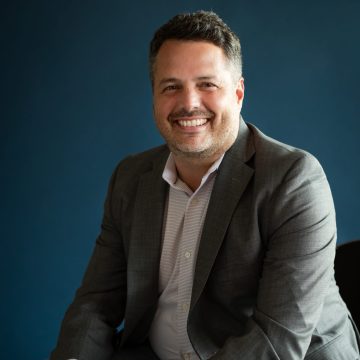Story
Risk for Reward
With the Neighborhood Development Center, Mihailo “Mike” Temali (BF’98) works with urban communities to help them grow from within
DATE
June 24, 2020

by Sarah Chandler
Photography by Hunt + Capture
Mihailo “Mike” Temali is many things: the proud son of Danish and Yugoslav immigrants, founding CEO of the Neighborhood Development Center (NDC), Eagle Scout, husband, father and dyed-in-the-wool St. Paul East Sider. Just don’t credit him as the mind behind Midtown Global Market, a multicultural food destination in south Minneapolis.
“This wasn’t my idea,” Temali insists with a smile, surveying the market’s exuberant mix of diverse families, couples and Abbott Northwestern Hospital medical staff in mint-green scrubs. Lunch options surrounding them include tamales from La Loma, East African camel burgers from Safari Express and turmeric-scented tikka masala from Hot Indian Foods. Inspired by public markets like Seattle’s Pike Place and Philadelphia’s Reading Terminal Market, the team that developed the blueprint for Midtown Global Market as a community business incubator built upon the momentum of NDC’s earlier flagship project, Mercado Central.
Investing in Low-Income Neighborhoods
Temali, a 1998 Bush Fellow, has spent his entire career investing in entrepreneurs and small businesses as catalysts to transform low-income neighborhoods. In the early 2000s, NDC and other partners joined with the City of Minneapolis to transform the abandoned Sears Roebuck building in south Minneapolis into a neighborhood hub with office, residential, commercial and community uses. In 2006, the $190 million Midtown Exchange project, including Midtown Global Market, was complete. The project Temali calls “an insane risk” paid off, and remains a welcoming international signifier of Minneapolis’ 21st century urban renaissance.
That’s not by accident. NDC, whose mission encompasses community development, community organizing and microfinance, endeavors to harness “the personality of the business owner and the personality of the neighborhood,” Temali says. New entrepreneurs receive technical assistance, legal help, marketing consultation and business training classes in five languages: Spanish, English, Hmong, Somali and Oromo. With these resources, they can make the most of the loans the NDC offers — a total of nearly $25 million to date.
A stroll through the Market reveals the power of building strong relationships for growing a business. Taco Cat’s chefs, Intown Sushi proprietor Than Zaw and chief maintenance engineer Melissa Marcelle all greet Temali. Marcelle, a Native American entrepreneur, participated in NDC’s business training sessions before launching The Greenery, a plant shop.
“We’ve trained close to 6,000 low-to-very-low-income people to start a business,” Temali marvels. Close to 90% of these aspiring business owners are people of color. Since its inception, NDC’s training has led to the launch of more than 1,000 small businesses, about half still open, and the creation of more than 5,000 jobs, according to Wilder Research estimates. Well more than half of these businesses employ neighborhood residents, hire people of color and occupy formerly vacant buildings. NDC’s free classes don’t sugarcoat the challenges of entrepreneurship, and the training leads some to get out before getting started. As for businesses that launch and crash, Temali maintains that NDC’s role is partner, not parent.
“When these things blow up, which they do,” he muses, “we have pretty deep insight into what went wrong. But we are not the driver.”
East Side Kid
It’s an old question: Are leaders born or made?
Mike Temali’s Yugoslavian attorney father and Danish social worker mother met in a World War II displaced persons camp and eventually emigrated to Youngstown, Ohio. Between them, Temali’s parents spoke seven or eight languages — but English was initially foreign to his father. His father’s inability to communicate, Temali recounts, created a son with empathy for immigrants who, despite their skills and knowledge, were often consigned to low-wage work and discrimination due to language barriers in the U.S. “We dismiss them even though they might have a Ph.D. or be a judge in their home country,” he says.
In the mid-1950s, the family settled in the Dayton’s Bluff area of St. Paul. Temali describes the East Side of the 1960s as “white, blue collar and dominated by three employers: Hamms, 3M and Whirlpool — all companies that have since left the neighborhood.”
In his 2002 book, “The Community Economic Development Handbook,” Temali describes two neighborhoods: in the first, litter swirls around boarded-up storefronts and residents lucky enough to be employed work elsewhere. The other neighborhood is well-maintained and buzzing with economic and cultural activity. Temali writes, “Imagine that these two neighborhoods are actually the same neighborhood, 5 or 10 years apart in time.”
Temali witnessed the rapid decline of Dayton’s Bluff when the construction of Interstate 94 flattened whole city blocks of St. Paul’s East Side. People left the neighborhood, and by the Internet age, the mom-and-pop businesses succumbed to gentrification.
“We no longer have neighborhood churches, schools or diners — so what you have is isolation,” he says. “NDC spends a lot of our work rebuilding community gathering places.”
A Lightbulb Moment
In 1990, St. Paul’s Western Bank — then a local family-run institution in Frogtown — hired Temali to extend the reach of its community impact. In those days, Temali was running a two-person office for North End Area Revitalization (NEAR), which focused on supporting local businesses in the Rice Street commercial district.
Temali convinced Western Bank chairman Bill Sands to join him on an impromptu fact-finding trip to Chicago, where the South Shore Bank had become a game-changing economic force on the impoverished South Side. Not long after the trip, Temali experienced what Sands calls a lightbulb moment: “What if we tapped into neighborhood residents’ skills and talents and asked them if they might be interested in training and technical assistance to either create or expand a business? NDC took off from there.”
An early focus was to help the Latinx community, many of whom were monolingual Spanish speakers, to kickstart businesses. By the mid-1990s, several graduates of the NDC business course envisioned an exciting idea: a mercado, or Mexican-style market, with local entrepreneurs selling food, clothing and household wares. In 1999, Mercado Central launched on Lake Street. Two decades later, the project has come full circle: NDC sold the building for $1 to the cooperative of tenants, making Mercado Central truly community owned.
Build Community from Within
Temali (second from right) receiving the 2013 E Pluribus Unum Prize for exceptional immigrant integration initiatives with (from left) NDC CFO Teshite Wako, Senator Amy Klobuchar and NDC accountant Daniel Birru in Washington, D.C. (Photo courtesy of Mike Temali)
NDC has focused on changing negative perceptions of Twin Cities neighborhoods from within. According to NDC, reversing systemic, long-term economic depression and social inequity is not so much bottom up, but inside out. Entrepreneurs start with things they already possess: knowledge, skills, passion and dreams.
“Mike has always believed that you build a community, a city, from within,” says Patti Tototzintle, a longtime NDC board member and CEO of St. Paul domestic violence shelter Casa de Esperanza. “That means you trust the people who live in the community.”
Scaling NDC up from one staff member to 35 has created more challenges along the way. “How do you train and align everyone with the mission?” Temali wonders. “How do you stay out of day-to-day issues? There are a lot of judgment calls — how do you make the endless daily decisions while balancing mission and financials?”
The Spirit of Adventure
The 66-year-old Temali is, at heart, an adventurer. Over a lunch of shrimp tagine at Moroccan Flavors inside Midtown Global Market, Temali recounts hitchhiking out west after college with a pair of skis and $20.
“It was my biggest training for this career,” he says with a laugh. “Your job as a hitchhiker is to get the driver talking — so that they keep driving and take you where you need to go.”
Later, trips to Peru, Bolivia, Indonesia and Thailand in the early ’90s were research in the emerging practice of microfinance for community development. In 1998, Temali took a leave of absence from NDC for a Bush Fellowship. He studied microlending and community development in Santiago, Chile. “Those lessons learned abroad during the Bush Fellowship,” he says, “became completely integrated at the NDC, creating a more powerful and confident base.”
What works in Santiago, he found, may not work in Minneapolis. “The amount of work it takes to go from the informal economy to the formal economy in a society like ours is significantly more,” he says. “A loan isn’t enough. You need training and technical assistance.”
Yet, he warns, “There’s a balancing act between overseeing entrepreneurship and scaring the hell out of people.”
Closing Opportunity Gaps
Also during his Fellowship, Temali gained more perspective on microlending during six months of economics and finance study at Harvard and MIT. While in Massachusetts, he audited lectures with “rock-star professors” teaching students how to scale and how to bring in other people’s money. His time included internships at the Initiative for a Competitive Inner City and global financial nonprofit ACCION USA.
One MIT professor was incredulous when Temali explained NDC’s work: “‘Let me get this straight,’ he told me, ‘You work with low-income people with bad credit and no money to start businesses that they’ve never run before, in tough low-income neighborhoods? You are brilliant at selecting for failure.’”
Where his professor saw failure, Temali saw potential. “Mike taught me that when you have an area with high deficiency or disparity, you have to create high opportunity,” says Mike Goze, CEO of American Indian Community Development Corporation (AICDC) and an NDC board member. “He has taken on a tremendous role in the development of underserved and newer immigrant populations — Hmong, Latino, Native, Somali and East African — who have all been helped by NDC.”
The motivation behind working with underserved entrepreneurs is not merely economic, but philosophical. “Success is not measured by turning a boutique business into a corporation,” Temali insists. “One of our goals is to get a whole lot of people of color on the ladder, and most haven’t had that chance. We get 95-98% of our loans paid back. The numbers speak for themselves.”
In the case of Hot Indian Foods, NDC mentorship and loans helped a popular food truck business expand to four brick-and-mortar locations, including Midtown Global Market and Target Field. Another NDC-trained success story is Los Ocampo, a taqueria chain with more than 150 employees. “If I have a problem, Mike gives me a solution — or he gives me the number of someone who might have the solution,” says founder Armando Ocampo.
Until recently, Temali still faced occasional pushback from national funders and legislators who believed that NDC only helps mom-and-pop businesses. But the COVID-19 shutdown changed the narrative. “For the first time in my career, there is a national realization of what communities are like with small and micro businesses shuttered,” he says. “Fifty percent of America works for these businesses, and suddenly they’re unemployed and not paying rent while they’re closed. Visually, our neighborhoods’ commercial corridors look like a ghost town. It’s where people get their daily experiences and needs met, whether it’s getting their haircut, a lunch, a morning coffee or an evening workout. Small and micro businesses have the nation’s attention, one level below the health workers in terms of priorities.”
The National Stage
NDC’s strategies have become the gold standard among community development organizations. As the founder of NDC’s national program, the nonprofit Build from Within Alliance (BfW Alliance), Temali has traveled to cities from Anchorage to Miami to train local leaders and guide community development operations across 37 low-income neighborhoods in 12 cities. The mission is a familiar one: build neighborhoods, empower diverse entrepreneurs and disrupt poverty.
“The United States is good at doing two things with low-income neighborhoods of color: abandonment and gentrification,” Temali reflects.
While leading the BfW Alliance, Temali is slowly handing off regional NDC leadership to Renay Dossman, the new Twin Cities executive director. BfW seeks to carry out NDC’s four pillars: training, lending, technical assistance and real estate. By including ownership, successes of newly thriving neighborhoods do not force longtime residents and businesses to relocate when property values rise.
Recently, climate change has also influenced the BfW Alliance’s work in low-income communities. In hurricane- and flooding-prone coastal cities like Miami and Houston, land at safer elevations in low-income neighborhoods becomes vulnerable to developers and corporations. If the community doesn’t buy the land, skyrocketing prices and gentrification are imminent threats, Temali predicts.
Rooted Resilience
For all of Temali’s relentless energy, he’s also a keen listener who exudes a calm focus. His colleagues describe him as fun-loving, with an infectious sense of humor and a fierce willingness to embrace uncertainty. “He takes the risks that need to be taken,” affirms NDC board member Mike Goze.
So how does an effective leader maintain resilience through the inevitable storms that risk invites? Unsurprisingly, Temali finds balance by staying rooted in the community where he grew up. “I live six minutes from my office, even in bad weather.” Lifelong friendships ground Temali. When he married wife Laura, an adult education teacher with whom he has two children, five friends he has known since childhood flanked him at St. Sava Serbian Orthodox Church.
Would Temali blanch at being called a rebel or a visionary? Probably. He says he has weathered every difficulty and celebrated every success in tandem with community leaders. Yet his vision remains bold.
“I’ve spent my entire career embracing this one tool for community empowerment,” he says. “I don’t view my role at NDC as the driver of these businesses: it’s their energy, ideas, skills and families who sacrifice. It’s their 100-hour work weeks. I have never spent one day in this alone, and I have never taken one step alone.”
Continue reading
-

News
Opportunity to work with us
As part of our office move later this year, we are exploring possibilities for the build out of the ground floor of the building. We are in the early stages of this and considering different types of operating models and potential partnerships.
-

Staff note
Coordinating the work of our contact hub
We aim to be radically open in all that we do, and that includes being more accessible to more people and sharing what we learn along the way.
-

Staff note
Making every dollar work through impact investing
We have benefitted from the experience of other funders as we developed our impact investing approach. Now we are paying it forward and sharing what we have done and what we have learned.